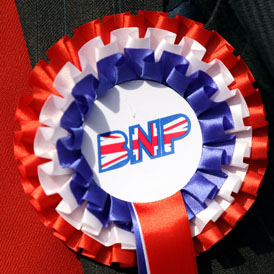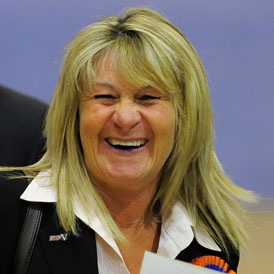Britain’s first BNP mayor ‘won’t halt party’s decline’
A BNP councillor is in line to become the party’s first mayor. But Channel 4 News learns that the far-right party is still bracing itself for a tough time at next month’s local elections.

The election of the UK’s first British National Party (BNP) mayor will not rescue the ailing far-right party’s fortunes at next month’s council elections, according to both supporters and opponents.
John Cave is in line to become the civic leader of Padiham, near Burnley in Lancashire, after fellow councillors chose him as the town’s new deputy mayor.
He becomes deputy next month and is expected to be inaugurated one year later as the new mayor of a town just three miles away from the scene of the 2001 Burnley race riots.
“Politics does not come into it. It’s completely irrelevant.” John Cave
But by the time Mr Cave takes office he may find that his party’s aspirations to become a force at the ballot box in England are in tatters, according to its opponents.
The BNP itself has admitted it is putting up fewer candidates in England in next month’s polls in an attempt to concentrate on Scotland, Wales and Northern Ireland, with a party spokesman conceding that internal divisions and declining support mean its chances of success in its traditional heartlands are slim.
A spokesman called Mr Cave’s election as a future mayor “splendid news”, but Mr Cave has so far declined to trumpet his success as a triumph for the party, saying his far-right views were “irrelevant” to his assuming the office of mayor.
He said: “This is not meant to be a political forum of any sort. It is a town council, akin to a parish council.
“This is not party politics, this is all about Padiham. Politics does not come into it. It’s completely irrelevant. This has been blown out of all proportion.”
Unite Against Fascism said the BNP is weaker in the Burnley area than at its 2003 high point, with two members now sitting on Burnley borough council instead of eight. One of them is Mr Cave’s wife and the probable future mayoress of Padiham, Sharon Wilkinson, who also sits on Lancashire County Council.

“The equality case hit really bad. It cost us a lot of money. It caused internal division. It has hit us.” Simon Darby
The campaign group says the BNP is putting more than 260 candidates forward in next month’s local council elections, a sharp drop on the 655 party members who stood in the same areas last time they went to the polls in 2007.
The BNP said it could not immediately confirm the accuracy of the number.
But deputy chairman Simon Darby told Channel 4 News an expected upsurge of support for Labour, divisions within the BNP’s ranks and an attempt to win new votes in the Celtic fringes mean the party was indeed scaling down its ambitions in England.
The party heads to the ballot box a year after a General Election in which the party failed to win a single seat, with leader Nick Griffin beaten into third place in Barking. In 2009 the Equality Commission won a legal battle that forced the BNP to change its constitution to allow non-white members.
Mr Darby said: “We’re not putting up as many as last time in England but we are putting up candidates in Northern Ireland, all of Wales and all of Scotland.
“We have to play our best hands. Labour are going to do particularly well, we feel, in local elections. The Liberal Democrats are going to struggle and the Tories are going to fall flat.
“We have looked at it and we thought our best chances are going to come in Wales. The Single Transferable Vote system in Northern Ireland is obviously uncharted territory for us.
“We think we can appeal to people on both sides of the community there. We have heard reports of people from the nationalist, or republican, community who have burned out migrant workers.
“They have actually driven them out of their houses. There is feeling on both sides, and the electorate in Northern Ireland tend to be more conservative, with a small ‘c’. They do feel that things are slipping away – this creeping liberalisma and anti-Christian agenda.
“We feel that we can get votes from both sides of the community”
He added: “The equality case hit really bad. It cost us a lot of money. It caused internal division. It has hit us. It was a huge outlay of time and resources.”
Read more: FactCheck – would AV help or hinder the BNP?
Weyman Bennett from Unite Against Fascism echoed his words, saying: “We don’t believe the BNP can do well in England. The place where they the best chance of doing well is in Wales.
“This election will be a referendum on the Government and in those conditions, the BNP can’t do too well. I’m not making a prediction but I would argue that the main issue will be the cuts and what they mean for different people.
“The BNP don’t really register on that level. The racist argument doesn’t cut it.”
He went on: “I don’t think the BNP as an organisation are on the up. They suffered real damage when Griffin lost in east London. We are not talking about the sudden rise of the BNP. They are just still infecting small parts of communities that the mainstream parties have failed to penetrate into.”
-
Latest news
-
As India goes to the polls in the world’s largest election – what do British-Indians think?6m

-
Tees Valley: Meet the candidates in one of the biggest contests coming up in May’s local elections4m

-
Keir Starmer says public sector reform will be a struggle7m

-
Nicola Sturgeon’s husband Peter Murrell charged with embezzlement of funds from SNP1m

-
Ukraine might finally get $60billion in American weapons and assistance to defend against Russia3m

-




